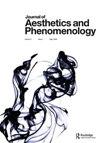Out of the experience of poetry
IF 0.2
0 PHILOSOPHY
引用次数: 0
Abstract
ABSTRACT This contribution to phenomenological aesthetics takes inspiration from Martin Heidegger’s idea that poetry arises out of the experience of thinking and thinking out of the experience of poetry. The mutual nourishment of philosophy and poetry is put into practice here through a presentation of three poems and the reflections they provoke. The poems are the work of a contemporary Lithuanian-American poet, Rita Malikonytė Mockus. The reflections derive their basic orientation from Heidegger’s phenomenological philosophy of art. This philosophy is phenomenological inasmuch as it views art in terms of what Being and Time characterizes as the preeminent phenomenon, the one bestowing presence on beings while itself receding from presence. This phenomenon, for Heidegger the one and only phenomenon in the strict sense, is Being as bestower of presence. For Heidegger, art in general and especially poetry might “awaken and found anew our vision of, and trust in, that which bestows.” Such vision and trust correspond to the ancient attitude of reverence for what has been bestowed, versus the hubristic attitude of modern technology. The goal of the paper is to appeal to poetry in order to help awaken this reverential attitude which Heidegger sees as the antidote to the thrall cast over us by the things of modern technology. At the end, reverence is brought into relation with Kant’s conception of the beauty of nature as purposiveness without a purpose.来自诗歌的体验
这一对现象学美学的贡献的灵感来源于马丁·海德格尔的诗歌产生于思维的经验,思维产生于诗歌的经验。通过对三首诗的介绍及其引发的思考,将哲学与诗歌的相互滋养付诸实践。这些诗是当代立陶宛裔美国诗人丽塔·马利科尼特·莫库斯的作品。这些反思的基本取向来自于海德格尔的现象学艺术哲学。这种哲学是现象学的,因为它从存在和时间所表征的卓越现象的角度来看待艺术,即赋予存在而自身又从存在中退缩的现象。这种现象,对于海德格尔来说,是严格意义上唯一的现象,是存在作为存在的赋予者。对海德格尔来说,艺术,尤其是诗歌,可能会“唤醒并重新发现我们对所赋予的东西的愿景和信任。”这种愿景和信任对应于古代对所赋予东西的敬畏态度,而不是现代技术的傲慢态度。本文的目的是呼吁诗歌,以帮助唤醒这种虔诚的态度,海德格尔认为这种态度是现代技术给我们带来的束缚的解药。最后,将敬畏与康德的自然之美概念联系起来,即无目的的合目的性。
本文章由计算机程序翻译,如有差异,请以英文原文为准。
求助全文
约1分钟内获得全文
求助全文

 求助内容:
求助内容: 应助结果提醒方式:
应助结果提醒方式:


